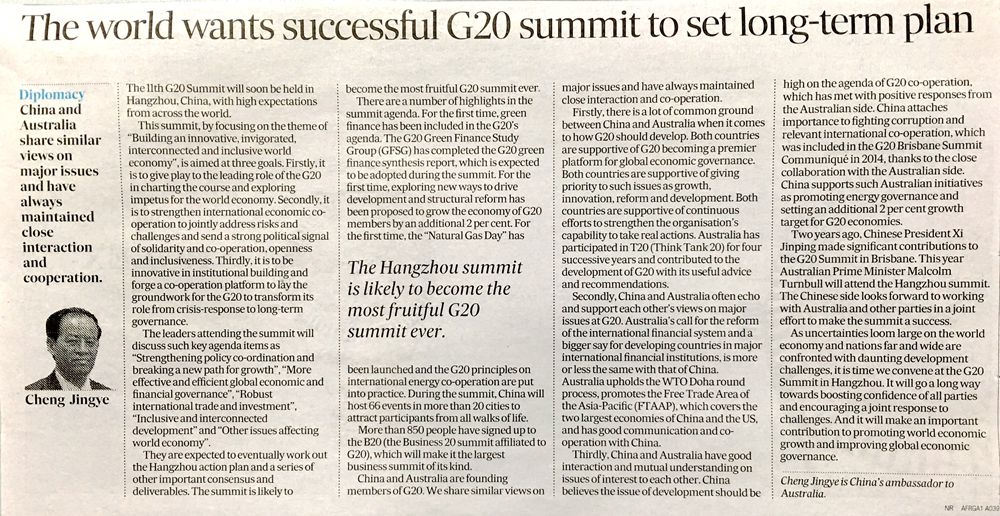2016年9月2日,驻澳大利亚大使成竞业在澳主流媒体《金融评论报》发表署名文章《世界期待一次成功的G20峰会》。
文章介绍了G20杭州峰会的主题、目标、重要意义和成果预期,指出中澳都是G20创始成员国,在主要问题上观点和看法相近,一直保持着密切沟通与合作。中方期待与包括澳在内的各方共同努力,合力举办一次成功的、富有成果的峰会。
文章认为,在当前世界经济不稳定性依然突出、各国发展挑战依然严峻的背景下,G20杭州峰会的召开适逢其时,必将对提振各方信心、携手应对挑战产生积极影响,为促进世界经济增长、完善全球经济治理作出新的重要贡献。

China and Australia want a successful G20 summit
by Cheng Jingye
The 11th G20 Summit will soon be held in Hangzhou, China, with high expectations from across the world.
This summit, by focusing on the theme of "Building an innovative, invigorated, interconnected and inclusive world economy", is aimed at three goals. Firstly, it is to give play to the leading role of the G20 in charting the course and exploring impetus for the world economy. Secondly, it is to strengthen international economic co-operation to jointly address risks and challenges and send a strong political signal of solidarity and co-operation, openness and inclusiveness. Thirdly, it is to be innovative in institutional building and forge a co-operation platform to lay the groundwork for the G20 to transform its role from crisis-response to long-term governance.
The leaders attending the summit will discuss such key agenda items as "Strengthening policy co-ordination and breaking a new path for growth", "More effective and efficient global economic and financial governance", "Robust international trade and investment", "Inclusive and interconnected development" and "Other issues affecting world economy". They are expected to eventually work out the Hangzhou action plan and a series of other important consensus and deliverables. The Hangzhou summit is likely to become the most fruitful G20 summit ever.
There are a number of highlights in the summit agenda. For the first time, green finance has been included in the G20's agenda. The G20 Green Finance Study Group (GFSG) has completed the G20 green finance synthesis report, which is expected to be adopted during the summit. For the first time, exploring new ways to drive development and structural reform has been proposed to grow the economy of G20 members by an additional 2 per cent. For the first time, the "Natural Gas Day" has been launched and the G20 principles on international energy co-operation are put into practice. During the summit, China will host 66 events in more than 20 cities to attract participants from all walks of life. More than 850 people have signed up to the B20 (the Business 20 summit affiliated to G20), which will make it the largest business summit of its kind.
China and Australia are founding members of G20. We share similar views on major issues and have always maintained close interaction and co-operation.
Common ground
Firstly, there is a lot of common ground between China and Australia when it comes to how G20 should develop. Both countries are supportive of G20 becoming a premier platform for global economic governance. Both countries are supportive of giving priority to such issues as growth, innovation, reform and development. Both countries are supportive of continuous efforts to strengthen the organisation's capability to take real actions. Australia has participated in T20 (Think Tank 20) for four successive years and contributed to the development of G20 with its useful advice and recommendations.
Secondly, China and Australia often echo and support each other's views on major issues at G20. Australia's call for the reform of the international financial system and a bigger say for developing countries in major international financial institutions, is more or less the same with that of China. Australia upholds the WTO Doha round process, promotes the Free Trade Area of the Asia-Pacific (FTAAP) which covers the two largest economies of China and the US, and has good communication and co-operation with China.
Thirdly, China and Australia have good interaction and mutual understanding on issues of interest to each other. China believes the issue of development should be high on the agenda of G20 co-operation, which has met with positive responses from the Australian side. China attaches importance to fighting corruption and relevant international co-operation, which was included in the G20 Brisbane Summit Communiqué in 2014, thanks to the close collaboration with the Australian side. China supports such Australian initiatives as promoting energy governance and setting an additional 2 per cent growth target for G20 economies.
Two years ago, Chinese President Xi Jinping made significant contributions to the G20 Summit in Brisbane. This year Australian Prime Minister Malcolm Turnbull will attend the Hangzhou summit. The Chinese side looks forward to working with Australia and other parties in a joint effort to make the summit a success.
As uncertainties loom large on the world economy and nations far and wide are confronted with daunting development challenges, it is time we convene at the G20 Summit in Hangzhou. It will go a long way towards boosting confidence of all parties and encouraging a joint response to challenges. And it will make an important contribution to promoting world economic growth and improving global economic governance.

